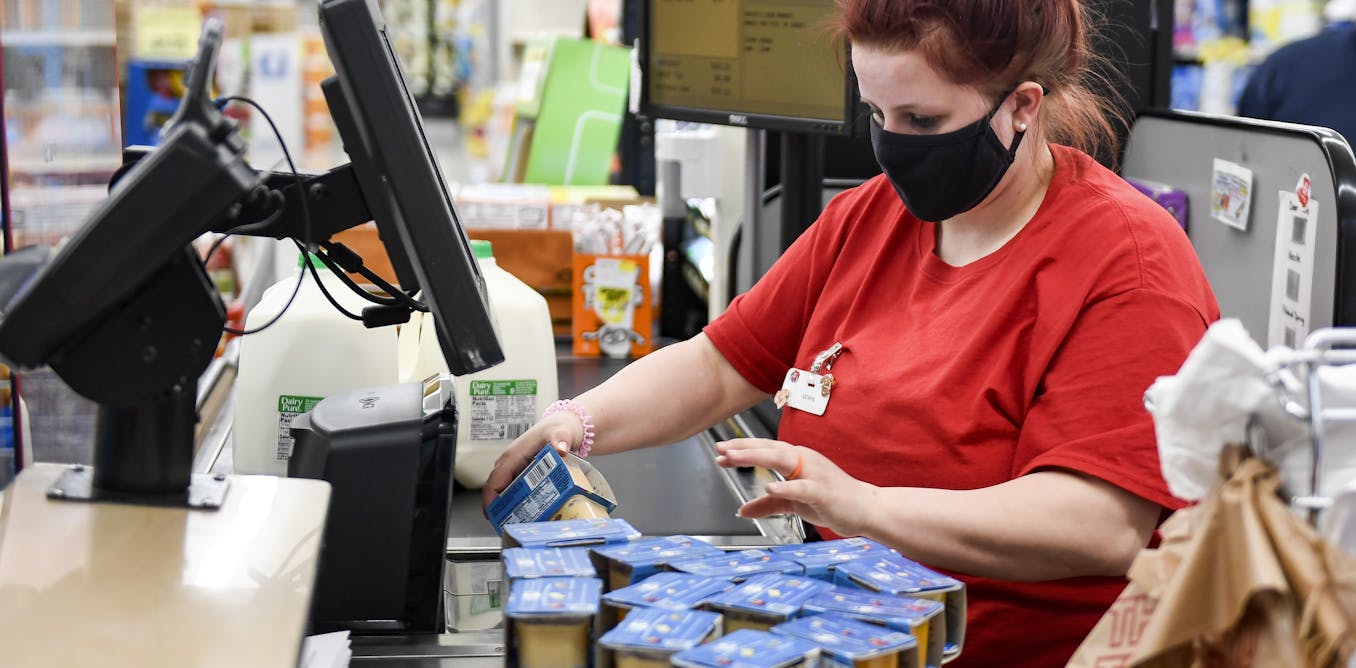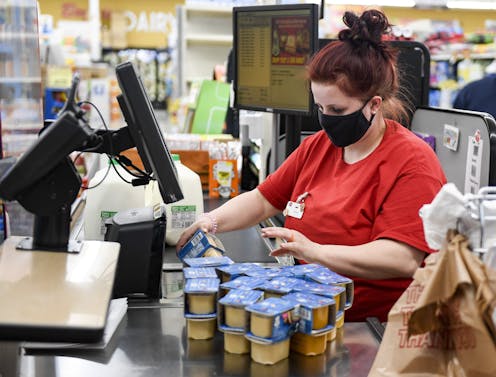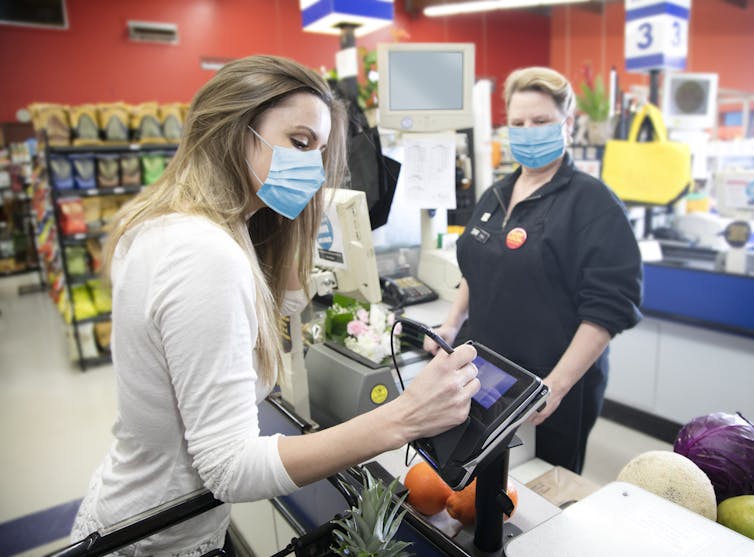Grocery workers suffer the mental health effects of customer hostility and lack of safety in their workplace
Supermarket employees, still laboring in crisis mode, continue to report significant rises in physical and mental health problems.


With the holiday season here, consumers are understandably desperate for a “normal” holiday season. For many, that includes big family dinners and Black Friday shopping sprees.
Retail and service sector workers have been laboring to keep shelves stocked and customers happy from the earliest days of the COVID-19 pandemic. Life on the front lines has been exceptionally stressful for these employees. Suddenly, they found themselves identified as “essential workers,” providing critical services while working in close contact with customers and coworkers. But unlike health care workers, grocery store employees had no prior experience or training in combating infectious diseases.
Early in the pandemic, the public celebrated grocery workers. They were hailed as “heroes” who were risking their lives for the benefit of their local communities. Billboards and the nightly news reminded the public to show kindness and compassion to store workers.
Major grocery chains initially offered their employees a “"hero bonus,” but that quickly went away. Many grocery workers soon felt forgotten as businesses and customers adjusted to the new normal.
We are a team of researchers from the University of Arizona with expertise in worker health, retail marketing, human development and public health. We have been following the impacts of the pandemic on grocery workers across the state of Arizona.
Our research and that of others show that rates of mental health distress among grocery workers are very high. In a newly published study, we reported that 20% of employees working in Arizona grocery stores in the summer of 2020 exhibited signs of severe anxiety and depression. And the mental health struggles of these workers do not show much improvement since we began our research in summer 2020.

Anxiety, depression and stress
By the summer of 2020, the Centers for Disease Control and Prevention reported a 14% increase in symptoms of anxiety and depressive disorders among the national adult U.S. population, compared with pre-pandemic levels. But for grocery workers, we found that the levels of anxiety and depression are more than twice the national average.
In July 2020, as the pandemic first peaked in Arizona, 22% of grocery workers reported symptoms of severe anxiety, while 16% reported symptoms of severe depression. Although those levels dropped slightly near the start of 2021, the effects of continually working in crisis mode can lead to significant persistent mental, physical and behavioral health problems.
Our online Arizona Frontline Worker Survey was developed in partnership with the United Food and Commercial Workers Local 99. They represent some 24,000 workers in the retail, meatpacking, hospitality and administrative sectors throughout Arizona. This survey tracks the experiences of these essential workers as they navigate the complexities of protecting their own health amid frequently hostile customer interactions and poorly defined safety measures.
We asked grocery workers to rate their sense of safety in the workplace, both in terms of their ability to protect themselves and the degree to which management prioritized their personal safety. Overall, about 60% of the 3,000 workers we heard from did feel generally safe in their workplaces.
The two most important factors that explained grocery workers’ high rates of mental health distress were the perceived absence of effective workplace protections and lack of enforcement of store policies like mask-wearing and social distancing.
For example, only 18% of grocery workers reported that they had received any meaningful training on pandemic-related safety protocols from their employer, despite existing guidelines and recommendations. Importantly, federal guidelines require all employers to provide basic training on COVID-19 mitigation measures, along with meaningful ways for workers to report their concerns to management without fear of retaliation.
Grocery workers who believed that their workplaces were safe placed a high premium on the enforcement of safety protocols specifically targeting customer behaviors. For example, our research found that grocery workers’ sense of safety increased three-fold when they also believed that store managers maintained clear policies requiring customers to wear masks and maintain social distancing. Those workers who felt safe at work had significantly fewer symptoms of mental health distress than those who felt unsafe.
Confrontations with customers
It comes as no surprise that customer hostility plays a significant role in the mental health of grocery workers. Over time, shoppers have become increasingly rude, to the point that interactions with customers are now often contentious and occasionally violent.
More than half of the grocery workers we heard from believe that they will be verbally threatened by an angry customer at some point during the pandemic. Employees are often on their own when it comes to getting customers to observe basic public health measures and be civil. Many lack support from management in enforcing the public health guidelines that serve to keep them, their families, coworkers and customers safe.
Leanne – a pseudonym – a young employee who has worked at a major grocery chain for three years, told us about her struggles with abusive behaviors on the job, in particular with respect to mask-wearing.
“Customers have come right into my personal space and leaned in to tell me why they’re not going to wear one – politics, uncomfortable, too hot, can’t breathe, their medical condition, etc. But I wear mine correctly for eight hours every day… to protect THEM.”
Most grocery workers earn low wages. Only half of all retail workers are eligible for employer-sponsored health insurance or paid sick leave. Our research suggests that this economically vulnerable workforce is taking on additional health risks during the pandemic while fearing that customers may verbally or physically assault them.
With all these risks and stressors, it is not surprising that rates of mental health distress among grocery workers are high. Job burnout is a real possibility, likely contributing to the national worker shortage.
Add holiday stress, and there’s more in store
The stressful situation for grocery workers may be amplified in the coming months. The National Retail Federation forecasts a busy holiday shopping season. It may even eclipse last year’s records despite increasing inflation rates and supply shortages. This is against the backdrop of increasing COVID-19 cases across the country. And as of Nov. 24, 2021, not quite 63% of the eligible U.S. population is fully vaccinated yet.
In our view, no worker – essential or not – should have to choose between a paycheck and risking their health and well-being. As shoppers flock to stores this holiday season in search of the perfect gift for their loved ones or ingredients for that favorite family recipe, their individual choices and consideration of local safety guidelines could help retail workers have a safer and merrier holiday season too.![]()
Brian Mayer receives funding from the Quick Response Research Award Program based on work supported by the National Science Foundation (NSF Award #1635593). Any opinions, findings, conclusions, or recommendations expressed in this material are those of the authors and do not necessarily reflect the views of the NSF or Natural Hazards Center.
Melissa A. Barnett, Mona Arora, and Sabrina V. Helm do not work for, consult, own shares in or receive funding from any company or organization that would benefit from this article, and have disclosed no relevant affiliations beyond their academic appointment.
What's Your Reaction?














































